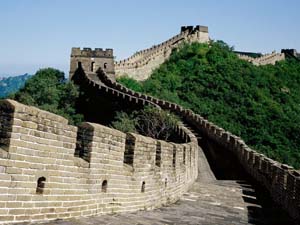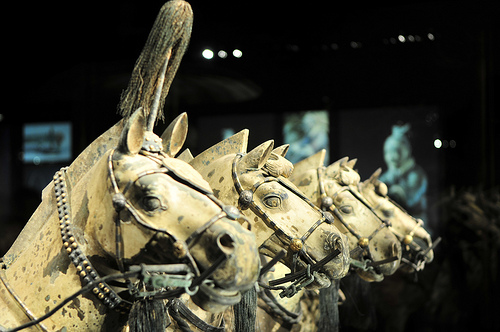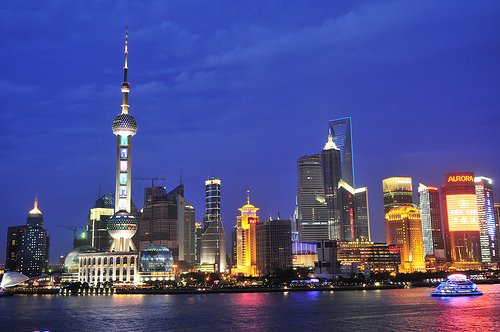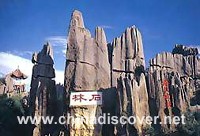| Day 1 Beijing ( ) |
| Arrive at Beijing. Be met & transferred to your hotel. Free time for the rest of the day. Recommend you to take a walk alone on Wangfujing Streeet, it is the most busy shopping area in Beijing. (optional) |
Wangfujing Streeet | It is the grandest shopping area in Beijing, congested with modern shopping malls, such as the Oriental Plaza, Wangfujing Department Store, etc. It is also home to a wealth of hotels and specialty shops. Around is an afflicted snack street where you can enjoy the most authentic Beijing snacks. |
|
 |
| [ Optional ] Badaling Great Wall: This sector is the first opened to tourists and the best preserved. Fully restored in 1957, it can be seen how it looked when it was first built in the Ming dynasty. Set in a steep, forested mountain range, Badaling offers superb views and good hiking experience. |
|
| Day 2 Beijing ( B,L,D ) |
|
Forbidden City | For almost 500 years, the Forbidden City served as the home of 24 Emperors and their households, and the ceremonial and political center of the Chinese imperial government. It was listed by UNESCO as a World Cultural Heritage Site in 1987. | Temple of Heaven | It was the place where the Emperor of the Ming and Qing dynasties would worship heaven and pray for good harvests. Built first in 1420, the Temple of Heaven is a precious example of China 's ancient architectural art and the largest design for worshipping heaven in the world. | Tian An Men Square | As the largest city plaza in the world, it is of great cultural significance for its seeing of several key events in Chinese history. Today here are always sightseers and kite-flyers. Most visit at dawn or dusk to see the flag raising and lowering conducted by the PLA. | Peking Opera | With a history of 160 years, Peking Opera, extolled as “Oriental Opera”, is representative of all operas in China. Full of Chinese cultural traditions and tidbits, the opera presents the audience with touching stories, beautiful paintings, exquisite costumes, graceful gestures and martial arts. |
|
 |
| [ Optional ] Terra Cotta Warriors and Horses Museum: Terracotta Warriors is the underworld terracotta army of Emperor Qin Shihuang (the first unifier of China, 259BC-210BC). It’s reputed as the Eighth Miracle of the World. Now the Terracotta Museum consists of Pit 1, Pit 2, Pit 3 and Pit 4 as well as the Hall of the two bronze chariots and horses. |
|
| Day 3 Beijing ( B,L ) |
|
Sacred Way | It was originally built to lead to Changling Tomb as a symbol of the passed emperor’s journey to heaven in their afterlife. Alongside the Sacred Road are 12 pairs of animal marble figures such as lions, elephants and 6 pairs human marbles such as generals and public officials. | Ming Tombs (Changling) | Changling Tomb is the largest and the most well-preserved one of the 13 Ming Tombs. Emperor Zhu Di, the third emperor of Ming Dynasty, and his Empress are co-buried in this grave. The 32 giant pillars in the Ling’en Hall, Changling’s main building, remain as solid as before after over 500 years. | Badaling Great Wall | This sector is the first opened to tourists and the best preserved. Fully restored in 1957, it can be seen how it looked when it was first built in the Ming dynasty. Set in a steep, forested mountain range, Badaling offers superb views and good hiking experience. |
|
 |
| [ Optional ] Oriental Pearl TV Tower: With 467.9 meters in height, It is the forth tower in height in Asia and the sixth tallest in the world, opposite to the Bund. Its transparent elevator will take you to the top, which will offer a quiet good view of Shanghai. The basement houses the Shanghai Municipal History Museum. |
|
| Day 4 Beijing, Xian ( B,L ) |
| Morning tour in Beijing. Later transfer to Xian by plane. Upon arrival at the airport, you will be met by our English speaking tour guide and transferred to hotel. Leisure on your own for the rest of the day. |
Hutong Tour by Rickshaw | Hutongs are small alleyways where people live together in communities of homes packed into a small area,just like a museum of Beijing's folk customs. Exploring Hutongs by rickshaw can find the residents playing Chinese chess, Mahjong,etc. | Summer Palace | The Summer Palace deserves your visit to her exquisite buildings, long corridor, and beautiful bridges. Her shoreline pathway makes an excellent run or walk for you. It was a luxurious imperial garden for royal families to rest and entertain in Chinese Qing Dynasty. |
|
 |
| [ Optional ] Stone Forest: Stone Forest is located in Shilin County, 89 kilometers from Kunming. The area, covering 350 square kilometers, is the highest karst terrain in the world and a national scenic area in China. |
|
| Day 5 Xian ( B,L ) |
|
Xian Bell Tower | Built in 1384 A.D, the Bell Tower boasts a history of over 600 years. It is the largest and best-preserved of its kind in China. Visiting the Bell Tower, you can still see the Big Iron Bell which was made in Ming Dynasty, 2,500 kilograms in weight. | Big Wild Goose Pagoda | It was built in 652 during the Tang Dynasty and currently boasts height of seven stories. It’s said that Master Xuan Zang built this pagoda to house the Buddhist scriptures and relics he had brought back from India. | Terra Cotta Warriors and Horses Museum | Terracotta Warriors is the underworld terracotta army of Emperor Qin Shihuang (the first unifier of China, 259BC-210BC). It’s reputed as the Eighth Miracle of the World. Now the Terracotta Museum consists of Pit 1, Pit 2, Pit 3 and Pit 4 as well as the Hall of the two bronze chariots and horses. |
|
 |
| [ Optional ] Jade Dragon Snow Mountain: The Jade Dragon Snow Mountain has 13 peaks of which the highest is 18000 feet above sea level. It is a treasure of wild plants and rare animals. Take cable car to the summit at Yunshanping Meadow or Yak Meadow. Trek for one hour around the summit. |
|